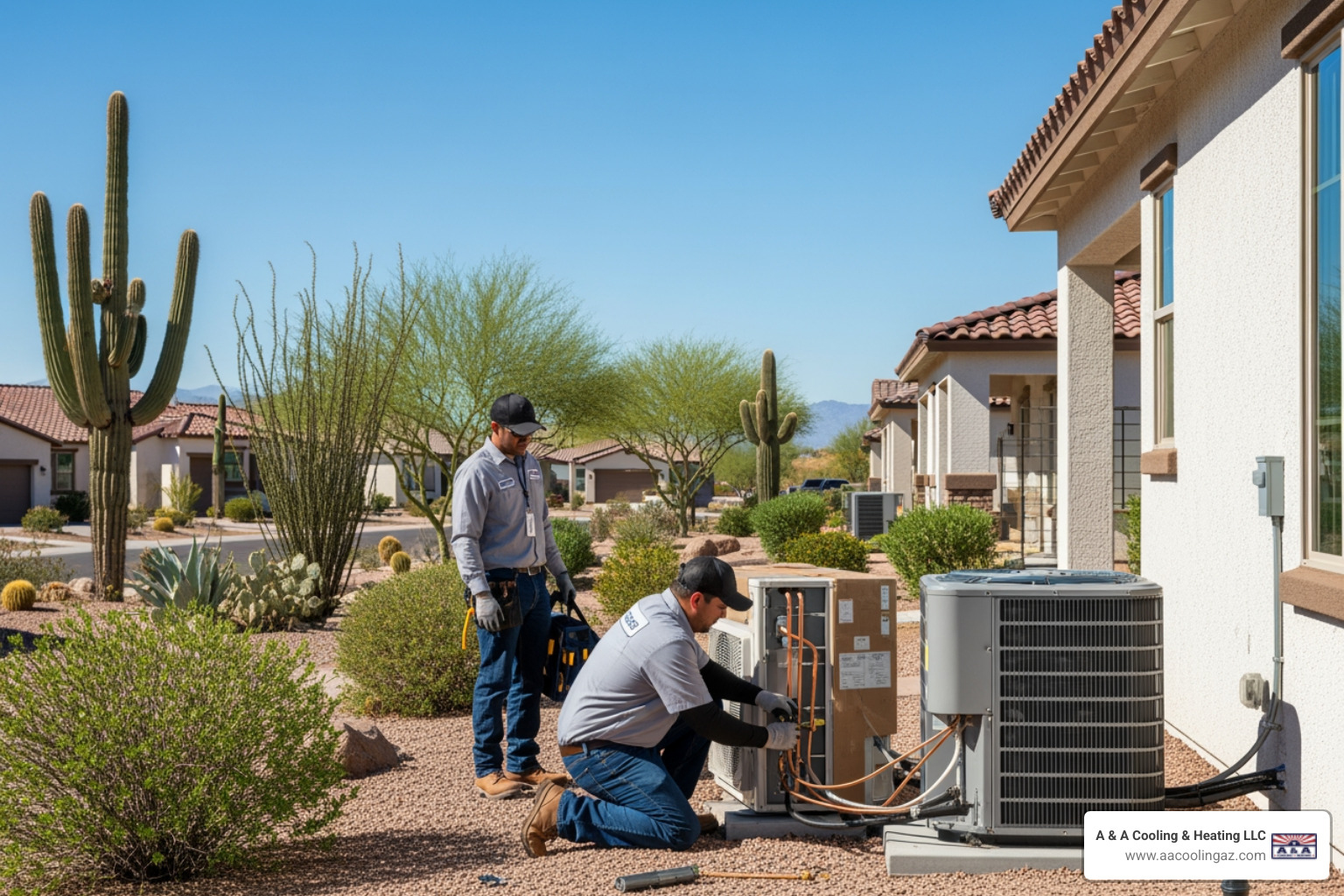Why Your AC Smells Like Mildew in San Tan Valley

A working AC system is a must during summer in San Tan Valley. But when you turn on your air conditioner and it smells like mildew, it’s hard to relax. A musty odor can ruin indoor comfort, especially when you’re trying to cool off during peak heat. That smell is more than unpleasant — it may signal a problem that needs real attention.
A mildew scent coming from your AC usually means something is growing or collecting inside the system. When that happens, not only does it affect how your AC performs, but it can also lead to issues with indoor air quality. Knowing what causes this smell and what signs to look out for can help you catch the problem early before it turns into something that requires a full AC replacement in your San Tan Valley home.
Common Causes of Mildew Smell in Your AC
A strong mildew odor from your vents often points to mold or moisture buildup inside the system. These conditions don’t just appear overnight. They happen due to a mix of trapped humidity, dust, and clogged components. Letting it go unchecked provides the perfect environment for mildew to spread.
Here’s what could be causing that mildewy smell:
- Full or clogged drain pan: The drain pan collects condensation, but if it becomes blocked or filled with stagnant water, it becomes a breeding ground for mildew and mold.
- Clogged drain line: AC systems remove moisture from the air, and that excess water is usually funneled out through a drain line. If that line gets blocked, water backs up, sits in the system, and starts to grow bacteria.
- Dirty evaporator coil: When the coil collects dust and doesn't drain properly, the moisture sticks around, adding to the risk of mildew.
- Air filter covered in dust: If the filter is full of dirt and debris, it not only reduces airflow but lets pollutants cycle through the ductwork, causing foul smells.
- Humidity inside the home: High humidity means more moisture in the air, and when that moist air keeps going through a dust-filled system, mildew can easily take hold.
Picture this: a family in San Tan Valley switches on the AC during a summer afternoon. Almost immediately, they notice a musty odor in every room. Turns out, the AC’s drainage line had been blocked for weeks. That extra moisture, combined with dust in the system, created mold growth in the indoor unit. All it took was a couple of cleaning missteps before things got out of hand.
Mildew may seem like a minor issue, but when left alone, it can lead to a bigger problem with your AC’s performance. You might start seeing higher cooling bills, reduced airflow, or even total breakdowns. It’s best to catch the cause early.
Signs Your AC Needs Attention
A mildew smell is often the most noticeable red flag, but other signs can confirm there’s a deeper problem with your cooling system. Catching more than just a bad scent can help you stay ahead of real AC trouble.
Pay attention to these warning signs:
1. Unpleasant odors each time the system runs
If the musty smell shows up right when the system kicks on, it's likely that the problem is inside the unit or ductwork.
2. Worsening allergy symptoms indoors
If household members start coughing more, sneezing frequently, or complaining of itchy eyes inside the house, especially when the AC is running, mold particles might be circulating through your system.
3. Spike in energy usage
A mildew-covered coil or clogged drain can make the system work harder just to cool your home. That means more electricity use and higher monthly bills.
4. Weaker airflow from vents
If vents that usually push out steady cool air now feel weak or inconsistent, dirt and mold inside the system might be restricting circulation.
5. Visible moisture around the indoor unit
Water stains, pooling condensation, or drips from the AC cabinet could mean drainage issues or excess humidity keeping things damp.
It’s easy to ignore these signs at first, but mildew isn’t going to go away on its own. Small issues can snowball if they continue through the summer months. If your AC system in San Tan Valley begins showing even one or two of these signs, it’s a good reason to bring in trained technicians to inspect it fully. Ignoring the smell could lead to bigger repairs or even force you to look into a full AC replacement when the damage becomes irreversible.
Preventive Measures to Keep Your AC Smell-Free
Once your AC starts giving off a mildew-like odor, it’s hard to ignore. But stopping that smell before it even starts is a lot easier than dealing with a damaged system or musty air throughout your home. San Tan Valley’s dry summers can still bring enough indoor humidity to trigger mold growth inside your air conditioner. That’s why routine care and quick action are so important.
Here’s what you can do to help keep your AC running clean and odor-free:
1. Replace air filters on time
Filters collect dust, dander, and other debris. When they get clogged, airflow suffers and pollutants settle inside your system. Switching your filter every few months can keep your indoor air fresh and prevent mold from forming.
2. Schedule regular system check-ups
Even if your AC seems to be running fine, professional inspections can catch early signs of mildew and fix drainage problems before they start causing smells or damage.
3. Clean around vents and return ducts
Dust and moisture can build up around supply and return vents in your home. Wipe these areas regularly to reduce what your system pulls in.
4. Keep the area around your indoor unit clean and dry
Any leaks or damp spots near your equipment can increase humidity levels and make it harder for your system to stay clean.
5. Use a dehumidifier if needed
In some homes, especially those with poor ventilation or older windows, indoor humidity may stay too high. Managing excess moisture with a separate dehumidifier can help reduce mildew inside the AC.
6. Don’t skip tune-ups
A basic tune-up can involve checking drain lines, coils, and refrigerant levels. It’s one of the most effective ways to extend the life of your AC and prevent bigger issues like mold odors.
Preventive care does more than reduce smells. It also helps stretch the lifespan of your AC and keeps the energy bills down. More importantly, it improves the air you and your family breathe.
Why You Might Need an AC Replacement
In some cases, all the cleaning and maintenance in the world won't help. If mildew continues to return or your AC struggles to cool your home, you may be dealing with a larger problem. Long-term moisture damage, mold buildup in hard-to-reach areas, or failing components might point to a system that’s past the point of repair.
Homeowners in San Tan Valley often delay replacing their AC because it seems costly. But ongoing repairs, decreased performance, and stubborn mold issues can sometimes cost more in the long run. If your system is older, lacks efficiency, or has been repaired multiple times for the same moisture-related problems, a full AC replacement might be a smarter option.
A new system offers several advantages:
- Better humidity management to reduce the risk of future mildew
- More energy-efficient cooling, which lowers operating costs
- Clean components that offer improved air quality from the start
- Stronger airflow and cooling power for hot San Tan Valley summers
Starting fresh with a new, well-sealed and properly sized system can stop mold issues from coming back. When your AC is matched to your home’s needs and installed by qualified professionals, it clears the path toward a noticeable difference in comfort and indoor air quality.
Staying Cool in San Tan Valley
If your AC smells like mildew, that’s a sign your system is trying to tell you something. It could be as simple as a dirty filter, or it might be a sign that moisture and mold are spreading inside your unit. Either way, the earlier you take action, the easier it is to fix the issue without major inconvenience.
Routine maintenance, timely filter changes, and inspections from HVAC professionals can go a long way in stopping mildew from setting in. If your system keeps having the same problems even after cleanings or repairs, it might be time to consider AC replacement for your San Tan Valley home. Replacing an underperforming or mold-prone unit with a newer system can solve stubborn odor issues and give you better cooling all summer long.
Addressing mildew smells isn’t just about comfort. It’s about protecting your home and making sure your family breathes cleaner air. When your AC system is well-maintained or properly replaced, staying comfortable through the heat in San Tan Valley becomes a lot easier.
If you are considering AC replacement in San Tan Valley to improve indoor comfort and energy efficiency, trust A & A Cooling & Heating LLC to guide you through the best options for your home. For a quick estimate or to book a service visit, please contact us today.



















